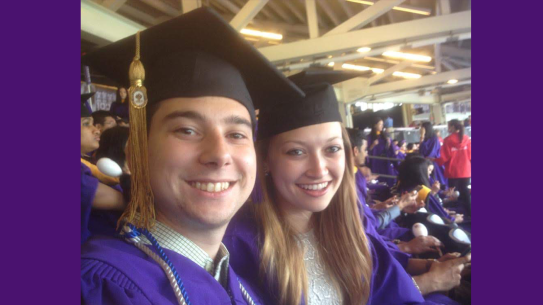International polling begins: What are the most pressing migration issues for data science?
The GovLab at NYU Tandon, the European Commission, and the International Organisation on Migration launch public online voting for 100 Questions Initiative
CAIRO, Monday, January 20, 2020 — The Governance Lab at New York University Tandon School of Engineering and its partners released the most pressing questions on migration that could be answered leveraging data and data science and asked the public to prioritize the order in which resources should be applied.
The questions were curated through an innovative process of sourcing “bilinguals” — individuals who have both subject matter and data expertise. The list is the first batch of questions within The GovLab’s 100 Questions Initiative — an effort to identify the most important societal questions that can be answered by data. Other domains include gender, air quality, disinformation, and the future of work.
Together with partner organizations International Organisation on Migration (IOM) and the European Commission’s Joint Data Research Centre, The GovLab Co-Founder and Chief Research and Development Officer Stefaan Verhulst unveiled the questions Sunday, January 19, at the Second International Forum on Migration Statistics, an international conference in Cairo. The top questions cover a wide range of topics, including migrant well-being, enforcement and security, and the vulnerabilities of displaced people.
“For data innovation to contribute to solving our challenges, we first need to have clear questions,” said Marzia Rango, research and data officer at IOM’s Global Migration Data Analysis Centre. “Through this work, we now have a greater understanding of where to collectively focus, from a data perspective.”
“This work ensures we have a list of credible, validated, and compelling prompts to address through data science,” said Michele Vespe, project manager at the European Commission’s Joint Research Centre.
Verhulst echoed these remarks: “Asking the right questions is essential to getting the most out of our datasets. It helps us understand what problems to focus our limited resources on.”
The release coincides with the launch of a public voting campaign to prioritize the top questions. Through the initiative’s new online platform, anyone with an internet connection can now vote on what they consider to be the most pressing questions about migration that could be answered with increased access to data or through the use of data science.
In addition to identifying key questions, The 100 Questions Initiative will also help create new data collaboratives. Data collaboratives are an emerging form of public-private partnership that help unlock the public-interest value of previously siloed data. The GovLab has conducted significant research on the value of data collaboration, identifying that inter-sectoral collaboration can both increase access to information (for example, the vast stores of data held by private companies) as well as unleash the potential of that information to serve the public good.
The 100 Questions Initiative was made possible with support from Schmidt Futures, Data2X, and the Bertelsmann Foundation. It is supported by a global advisory board comprising data science and subject matter experts from the public, corporate, and non-profit sectors. Members include Ciro Cattuto, scientific director of ISI Foundation; Gabriella Gómez-Mont, founder and former director at Laboratorio Para La Ciudad; Molly Jackman, strategy and research leader at Netflix; Vivienne Ming, founder of Socos Labs; Wilfred Ndifon, director of research at AIMS Global Network; Denice Ross, fellow at Georgetown University’s Beeck Center for Social Impact and Innovation; and Matthew Salganik, professor of sociology at Princeton University.
“Migration is a research field that overlaps a lot with highly contested debates in the public sphere,” said one of the bilinguals involved in the project, Ettore Recchi, a professor of sociology at Sciences Po and part-time professor at the Migration Policy Centre of the European University Institute. “Such debates are in desperate need of evidence coming from solid, value-free, impartial studies. In turn, migration research is a vast field of unsystematic data collection that serves the public interest only limitedly. The 100 Questions Initiative has the potential to streamline migration studies, helping them address the really focal issues, systematize their findings, and thus bridge the gap between research, public opinion, and policies.”
About The Governance Lab at the NYU Tandon School of Engineering
The Governance Lab's mission is to improve people's lives by changing the way we govern. Our goal at The GovLab is to strengthen the ability of institutions — including but not limited to governments—and people to work more openly, collaboratively, effectively, and legitimately to make better decisions and solve public problems. We believe that increased availability and use of data, new ways to leverage the capacity, intelligence, and expertise of people in the problem-solving process, combined with new advances in technology and science, can transform governance. We approach each challenge and opportunity in an interdisciplinary, collaborative way, irrespective of the problem, sector, geography, and level of government. For more information, visit thegovlab.org.
About the New York University Tandon School of Engineering
The NYU Tandon School of Engineering dates to 1854, the founding date for both the New York University School of Civil Engineering and Architecture and the Brooklyn Collegiate and Polytechnic Institute (widely known as Brooklyn Poly). A January 2014 merger created a comprehensive school of education and research in engineering and applied sciences, rooted in a tradition of invention and entrepreneurship and dedicated to furthering technology in service to society. In addition to its main location in Brooklyn, NYU Tandon collaborates with other schools within NYU, one of the country’s foremost private research universities, and is closely connected to engineering programs at NYU Abu Dhabi and NYU Shanghai. It operates Future Labs focused on start-up businesses in Brooklyn and an award-winning online graduate program. For more information, visit engineering.nyu.edu.




